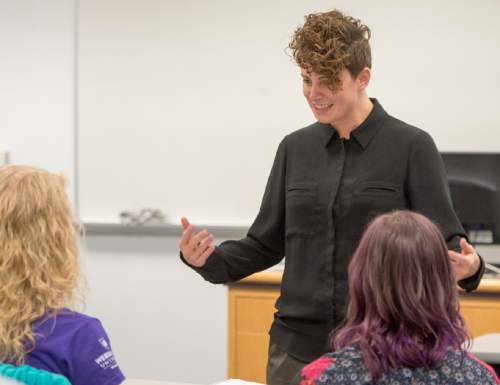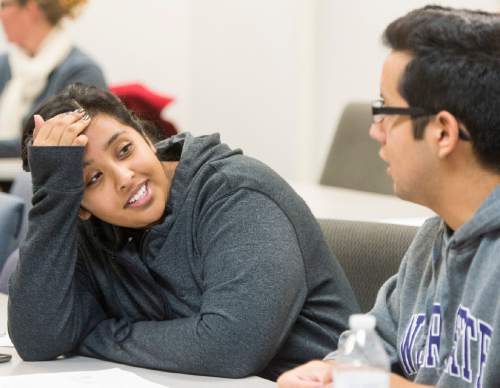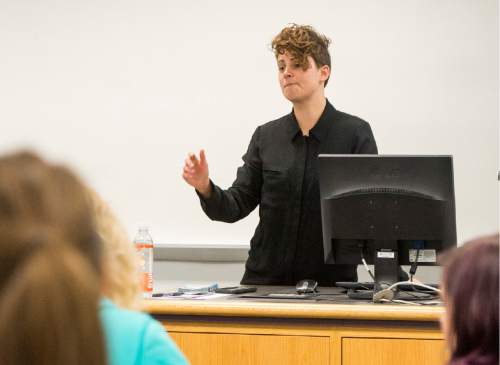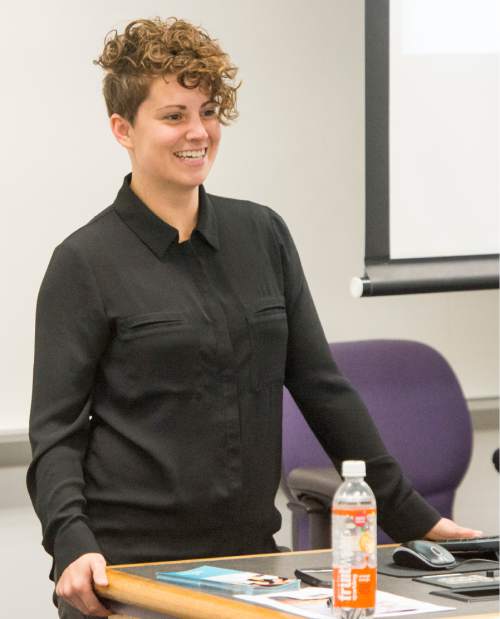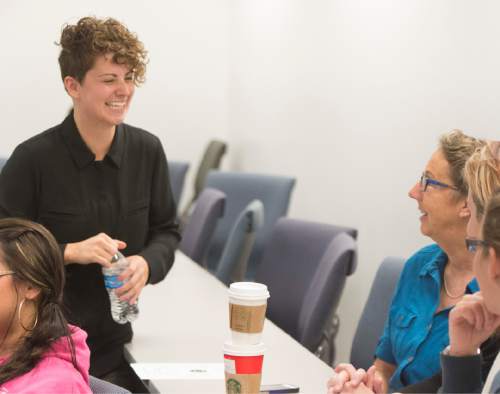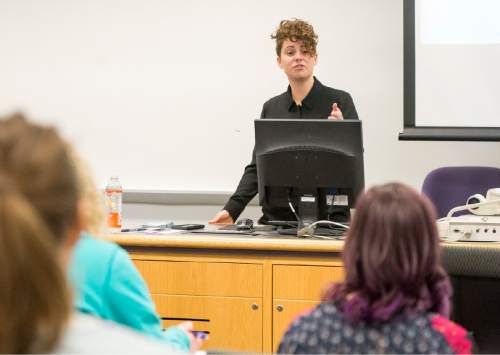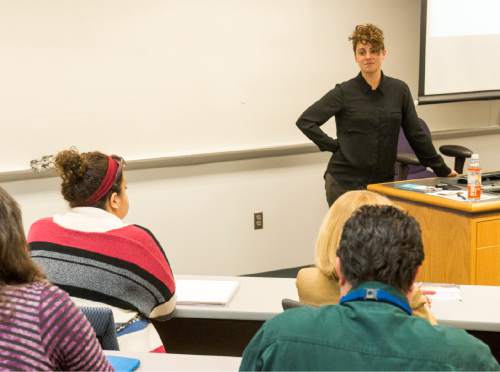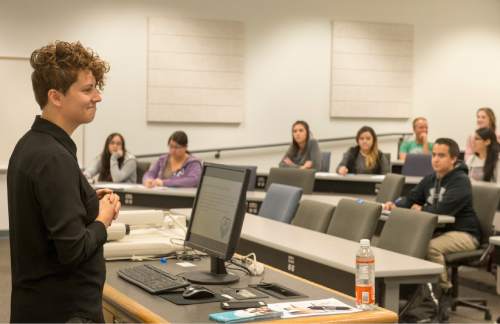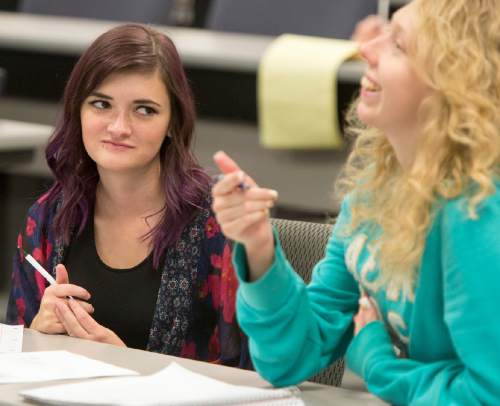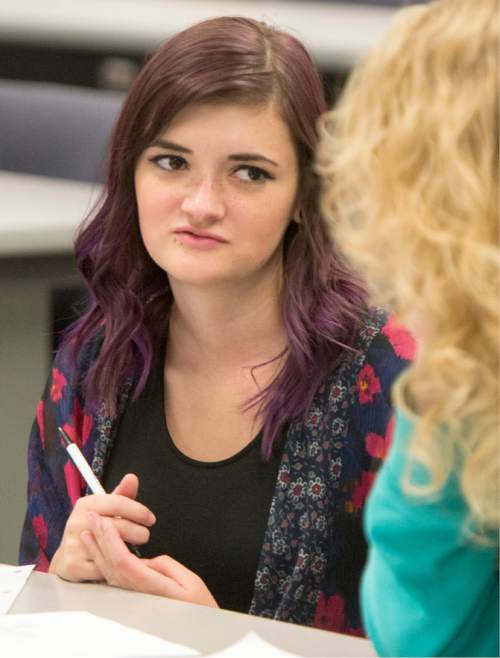This is an archived article that was published on sltrib.com in 2015, and information in the article may be outdated. It is provided only for personal research purposes and may not be reprinted.
Parker scans the crowd at a house party and likes what he sees.
He proclaims that he'll "definitely" take one of the girls home and, after pouring a beer and spotting a stranger alone on a couch, stakes his claim.
"Looks like someone could use another drink."
But she is cool to his advance, wary of the hand he puts on her leg. After Parker plies her with drinks and compliments, however, she begins to lean against him, smiling. He suggests they leave together and that she stay with him overnight.
Should fellow partygoers intervene? And at what point do they step in — without making things awkward? They have a split second to decide whether to ask the woman if she's OK, whisper to Parker that it's not a good idea to take a drunken woman home — or do nothing.
Utah's college students, on the other hand, have a little more time to consider potential ways to intercede. And many are required to do so.
The scenario is one that's dissected in Haven, an online training program used at six Utah colleges. The two-hour course highlights situations that are common yet overdue for attention on college campuses, say victim advocates: the boyfriend who sends aggressive texts and shows up unexpectedly at his partner's study group, the hookup in which one partner is reticent, the friend who cracks a rape joke.
Preventing sexual violence, counselors say, means spotting scary behavior and intervening — instead of focusing on what potential victims wear or how much they drink.
Haven is a "starting place" for that kind of prevention, said Stephanie McClure, director of the Women's Center at Weber State University. "It's the opportunity for every student to engage on their own time."
Most of the colleges are in their first or second year of offering Haven, which brings schools in line with new federal requirements for stronger efforts to prevent sexual assaults on campus.
Westminster College, Utah State University and Southern Utah University mandate that incoming students take the training, while Weber State, Salt Lake Community College and the state's flagship University of Utah do not.
And even for students who spend an hour or two at their laptops answering survey questions and signing that they've reviewed school consent policies and state sexual-assault laws, Haven is more likely to be a one-off cram session than an introduction to a wider education. None of the schools mandates follow-up training to the digital program, though it was designed to prepare students for further conversations.
"Haven's not intended to be a one-and-done, 'now you've solved the problem' type of program," said Rob Buelow, spokesman for EverFi, which makes Haven and other online courses. "It's important to sustain the impact."
Weber State junior Makayla Fowler believes more students should consider how they can help curb sexual assault on college campuses.
The need for this kind of consideration is "huge," said Fowler, a peer mentor and junior studying accounting. "It's only going to get worse if we don't talk about it."
—
A clear yes or no • Students watching Haven's videos and clicking through slides are asked to consider what it means to have consent — and reconsider some of their own intimate moments.
"If you aren't positive that someone is consenting to something," the program says, "don't move forward in any way."
It offers examples, saying students should strive to get a clear response of "yes" or "no" — and respect the decision. If someone doesn't actively respond to "Let's go to bed" or "Can I touch you there?" the correct thing would be to take the lack of response as a "no." Ambiguous answers such as "I don't know" are not consent, the program says. Neither is silence.
Haven's frank suggestions for healthy sex strike a different tone from the abstinence-only messages students may have heard just months earlier in Utah's high school classrooms.
"This may be the first time," said Jason Schwartz-Johnson, Westminster's Title IX coordinator, "that students have been asked to think this way" — and acknowledge that without someone's clear enthusiasm, having sex with that person is assault.
Some in Congress say the lessons should start in middle school. As part of a rewrite of the No Child Left Behind education law, the Senate voted to require that schools applying for federal funds to reduce violence and drug abuse describe how they educate students to clearly communicate about sex, and prevent coercion, violence or abuse.
"Sex-ed stuff is a subject for skittishness among some, but we're talking about crimes here. We're talking about crime prevention," said Sen. Tim Kaine of Virginia, who co-sponsored the provision with a fellow Democratic senator, Claire McCaskill of Missouri. "We assume people just know good or bad behaviors because it's in the ether, but ... people need to be taught appropriate behaviors — what's right, what's wrong, what are lines you don't cross."
Part of the value of the Haven training, its creators say, is that it gives a school insight into what its students think is appropriate, and the attitudes they've brought to campus.
Before and after the program's two sessions — designed to be completed weeks apart — participants are asked where, what and when they have learned about relationships in the past, as well as what they think healthy sex and relationships look like.
Though the survey data are anonymous, the questions are direct, asking students to share sensitive thoughts and experiences with their school.
Weber, the U. and Westminster are eager to receive the data, which they hope will paint an accurate picture of student perceptions of sex and relationships — and how Haven or other campus efforts might have changed those views. SLCC, on the other hand, opted out of asking its students to complete the surveys.
Also potentially uncomfortable for students is the idea that preventing — or promoting — sexual assault starts long before the moment it happens.
Students taking part in the Haven training are asked to consider whether society expects women and men to act differently, and how those expectations come into flirting and relationships. Haven points out that, for example, viewing sex as a conquest can create a climate conducive to sexual violence.
At the U., student actors were forced to think about that as they rehearsed a play based on the real-life 2012 rape of a 16-year-old girl by high school football players in Steubenville, Ohio.
Torin Scoffield's role as a high school football player and perpetrator made him rethink his past jokes that "no means yes" and realize that sexual assault is "a real thing that could happen to anybody," he said.
Cast members talked over how to step in when they think an assault might happen — as well as how to support friends who have survived an assault — with Katie Stiel, a program manager at the U.'s Center for Student Wellness.
But most students haven't had the chance to hear those tips and talk them over. Ideally, Stiel said, the Haven training will invite such conversations.
"We have this expectation of, 'Read this and come to campus and don't mess up,' " she said. "We're battling 19 years of rape mythology."
—
Sex education • Finding ways to have those conversations is a relatively new conundrum for schools scrambling to adhere to federal guidelines that took effect in 2014, roughly two years after the launch of a White House initiative to address sex assault on campus. Private and public campuses stand to lose federal funding if they don't strengthen efforts to prevent sexual assault.
"We're all moving in that direction," said Weber State Police Chief Dane LeBlanc. "It's not like we haven't been doing anything."
Many colleges seem to feel investing in Haven is a good way to avoid the fines. The tutorial fulfills the federal requirements that campuses provide students with information on how to get medical, counseling and other resources for themselves or someone else after sexual assault, stalking or relationship violence takes place.
The White House initiative created a "noticeable spike" in Haven's number of college contracts, EverFi's Buelow said. He declined to give specifics on growth, but said Haven is offered at more than 650 U.S. campuses.
Haven's cost depends on the size of the student body. Salt Lake Community College, for example, paid $31,000 for the program, while SUU gave $10,000.
At Weber State, 27 percent of students elected to take the program this year. The school also offers optional weekly workshops on how to maintain healthy relationships.
The school's Women's Center, which helps students find counseling and other resources, hopes to give course credit to students who lead the sessions as soon as next year.
More is needed, McClure said, but there's also no shortage of details to be worked out.
"Are you going to create a class for that? Are you going to do something at student registration?" she asked. "There's a lot of moving components that you would have to figure out."
Megan Waters, violence and injury prevention specialist at the Utah Department of Health, has some ideas.
She wants to see messaging "weaved in" to students' routines — splashed on stadium JumboTrons and posted in campus coffee shops, among other displays.
Such information shouldn't be something students have to seek out, she said, or be required knowledge only for specific groups.
"Just because you're reaching one sector of the student population," she said, "doesn't mean you're reaching all of them."
Some administrators are trying to increase the chances of students completing the Haven training by giving them options.
At SUU, students can decide whether to do the digital version or attend lunchtime forums that cover the same material.
SLCC is enticing students to use Haven by offering raffle prizes to those who participate. And at the U., student government leaders must take the training.
"That's been a great resource to talk about sex, period," said Ambra Jackson, president of the Associated Students of the University of Utah.
On her campus, she said, sex outside of marriage definitely happens, but often goes unaddressed. "We have to acknowledge that, first thing," she said, "before asking, 'What are consensual ways to have sex?' "
To help answer that question, the U. hosts afternoon seminars led by Title IX coordinators and advocates hoping to dispel rape myths, including the notion that someone must scream and fight for it to be a crime. Students in fraternities and sororities must attend the information sessions.
At Westminster, Haven is obligatory. First-year students at the private, liberal-arts-focused school must complete the course to sign up for second-semester classes.
"It sends a message to the students," said Schwartz-Johnson, "that we're behind this and we feel like it's an important part of your education."
The Associated Press contributed to this report.
aknox@sltrib.com
Twitter: @anniebknox Haven at Utah colleges
Six Utah colleges offer the online sexual-assault education program Haven
Brigham Young University
• Not offered
Salt Lake Community College
• Offered but not required
Snow College
• Not offered
Southern Utah University
• Required for new students
University of Utah
• Offered but not required
Utah State University
• Required for new students
Utah Valley University
• Not offered
Weber State University
• Offered but not required
Westminster College
• Required for new students What is consent?
Haven explores concepts students often encounter but might rarely discuss — such as what constitutes sexual consent. Haven notes that none of the responses to these scenarios, for example, qualifies as consent:
Let's go watch a movie in my room.
Response: OK :)
Consenting to sex? No
Know what I want to do to you?
Response: (asleep)
Consenting to sex? No
Let's go to bed.
Response: Awkward silence
Consenting to sex? No
Do you want to come back to my apartment so we can be alone?
Response: Uh, I don't know …
Consenting to sex? No


